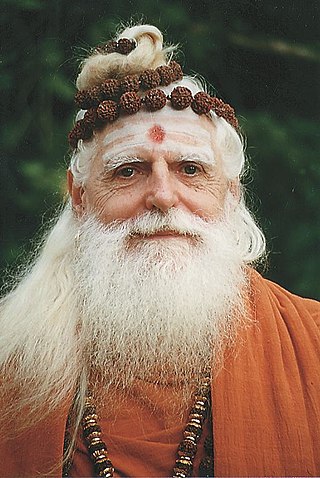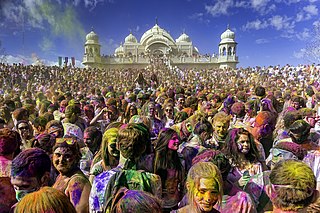| Formation | 2014 |
|---|---|
| Type | International organization |
| Headquarters | Delhi, India |
Region served | Worldwide |
| Leader | Swami Vigyananand |
| Website | www |
The World Hindu Congress (WHC) is a global forum for Hindus to connect, share ideas, inspire one another, and impact the common good.
It is organized by the World Hindu Foundation (WHF), an international Hindu organization. The WHC is organized around a central theme that encapsulates the essence of Hindu Dharma and its relevance in today's world. [1] Past themes have included "Sangachchhadhwam Samvadadhwam (Step together, Express together)", [2] "Think Collectively, Achieve Valiantly," [3] and "Dharma, the Abode of Victory." [4] The most recent 3rd summit was held in Bangkok, Thailand, from 24–26 November 2023. [5]

Dharma is a key concept with multiple meanings in the Indian religions, among others. Although no single-word translation exists for dharma in English, the term is commonly understood as referring to behaviours that are in harmony with the "order and custom" that sustain life; "virtue", or "religious and moral duties".
Hinduism is an Indian religion or dharma, a religious and universal order by which its followers abide. The word Hindu is an exonym, and while Hinduism has been called the oldest religion in the world, it has also been described as sanātana dharma, a modern usage, based on the belief that its origins lie beyond human history, as revealed in the Hindu texts. Another endonym for Hinduism is Vaidika dharma.

Hindus or Sanatani are people who religiously adhere to Hinduism, also known by its endonym Sanātana Dharma. Historically, the term has also been used as a geographical, cultural, and later religious identifier for people living in the Indian subcontinent.

Swami Dayananda Saraswati was a renunciate monk of the Hindu Saraswati order of sannyasa. He was also known as Pujya Swamiji and was a traditional teacher of Advaita Vedanta. He was the founder of the Arsha Vidya Gurukulams in Pennsylvania, USA; Rishikesh, Uttarakhand and Coimbatore Tamil Nadu, India. He was also the spiritual Guru of Prime Minister Narendra Modi. He was awarded the Padma Bhushan,, for his service to the nation in the field of spiritualism in 2016.

Hinduism in Southeast Asia had a profound impact on the region's cultural development and its history. As the Indic scripts were introduced from the Indian subcontinent, people of Southeast Asia entered the historical period by producing their earliest inscriptions around the 1st to 5th century CE. Today, Hindus in Southeast Asia are mainly Overseas Indians and Balinese. There are also Javanese and Balamon Cham minority in Cambodia and south central Vietnam who also practice Hinduism.
The Sangh Parivar refers, as an umbrella term, to the collection of Hindutva organisations spawned by the Rashtriya Swayamsevak Sangh (RSS), which remain affiliated to it. These include the political party Bharatiya Janata Party, religious organisation Vishva Hindu Parishad, students union Akhil Bharatiya Vidyarthi Parishad (ABVP), religious militant organisation Bajrang Dal that forms the youth wing of the Vishva Hindu Parishad (VHP), and the worker's union Bharatiya Kisan Sangh. It is also often taken to include allied organisations such as the Shiv Sena, which share the ideology of the RSS.

Sivaya Subramuniyaswami was an American Hindu religious leader known as Gurudeva by his followers. Subramuniyaswami was born in Oakland, California and adopted Hinduism as a young man. He was the 162nd head of the self claimed Nandinatha Sampradaya's Kailasa Parampara and Guru at Kauai's Hindu Monastery which is a 382-acre (155 ha) temple-monastery complex on Hawaii's Garden Island.

Hinduism is the third-largest religion in Indonesia, based on civil registration data in 2022 from Ministry of Home Affairs, is practised by about 1.69% of the total population, and almost 87% of the population in Bali. Hinduism was the dominant religion in the country before the arrival of Islam and is one of the six official religions of Indonesia today. Hinduism came to Indonesia in the 1st-century through Indian traders, sailors, scholars and priests. A syncretic fusion of pre-existing Javanese folk religion, culture and Hindu ideas, that from the 6th-century also synthesized Buddhist ideas as well, evolved as the Indonesian version of Hinduism. These ideas continued to develop during the Srivijaya and Majapahit empires. About 1400 CE, these kingdoms were introduced to Islam from coast-based Muslim traders, and thereafter Hinduism, which was previously the dominant religion in the region, mostly vanished from many of the islands of Indonesia.

Hinduism is the fourth-largest religion in the United States, comprising 1% of the population, the same as Buddhism and Islam. The majority of American Hindus are immigrants, mainly from India, Nepal, Sri Lanka, and Bangladesh, with a minority from Bhutan, Pakistan, Afghanistan and other countries.

Punjabi Hindus are ethnic Punjabis who are adherents of Hinduism; they constitute the third-largest religious subdivision within the Punjabi people, after Muslims and Sikhs, with a population numbering around 17 to 25 million. Punjabi Hindus are the second-largest religious group in the Indian state of Punjab. Apart from Punjab, they are also found in Haryana, Himachal Pradesh, Delhi, and Chandigarh today. Many of them have ancestry across the Punjab region as a whole, which was partitioned between India and Pakistan in 1947.
Hindu atheism or non-theism, which is known as Nirīśvaravāda has been a historically propounded viewpoint in many of the Astika (Orthodox) streams of Hindu philosophy. Hindu spiritual atheists, agnostics or non-theists who affirm the sanctity of the Vedas and the concept of Brahman, as well as those who follow astika (orthodox) philosophies but reject personal god(s), are also called Dharmic atheists, Vedic atheists or Sanatani atheists.

Hinduism is a minority religion in Belgium. According to the PEW 2014, Hinduism is also the fastest growing religion in Belgium. Attempts have been done by the Hindu Forum of Belgium (HFB) to make Hinduism an officially-recognized religion in Belgium.
Āśrama is a system of stages of life discussed in Hindu texts of the ancient and medieval eras. The four asramas are: Brahmacharya (student), Gṛhastha (householder), Vanaprastha, and Sannyasa (renunciate).

Interactions between Muslims and Hindus began in the 7th century, after the advent of the former in the Arabian Peninsula. These interactions were mainly by trade throughout the Indian Ocean. Historically, these interactions formed contrasting patterns in northern and southern India. While there is a history of conquest and domination in the north, Hindu-Muslim relations in Kerala and Tamil Nadu have been peaceful. However, historical evidence has shown that violence had existed by the year 1700 A.D.
Sanātana Dharma is an alternative term used by some Hindus to refer to Hinduism instead of the mainstream term Hindu Dharm. The term is found in Sanskrit and other Indian languages. It is generally used to signify a more traditional, pre-reform outlook of Hinduism.
Adi Dharm refers to the religion of Adi Brahmo Samaj the first development of Brahmoism and includes those Sadharan Brahmo Samajists who were reintegrated into Brahmoism after the second schism of 1878 at the instance of Devendranath Tagore. This was the first organised casteless movement in British India and reverberated from its heart of Bengal to Assam, Bombay State, Punjab and Madras, Hyderabad, and Bangalore.

Vishva Hindu Parishad (VHP) is an Indian far-right Hindu organisation based on Hindu nationalism. The VHP was founded in 1964 by M. S. Golwalkar and S. S. Apte in collaboration with Swami Chinmayananda. Its stated objective is "to organise, consolidate the Hindu society and to serve and protect the Hindu Dharma". It was established to construct and renovate Hindu temples, and deal with matters of cow slaughter and religious conversion. The VHP is a member of the Sangh Parivar group, the family of Hindu nationalist organisations led by the RSS.

The World Hindu Economic Forum (WHEF) is a nonprofit based in Delhi, India. It describes itself as an independent international organisation committed to the prosperity of Hindu society through the creation and sharing of surplus wealth. The forum brings together eminent Hindu intellectuals and businesses for the purposes of collaboration. The organization holds an annual international conference and several regional conferences in different parts of the world. Dr. Sriprakash Kothari was named as the chairperson of the second World Hindu Congress
Dharm Jagaran Samiti (DJS) is an Indian organisation working to convert Muslims and Christians to Hinduism, with a coordinating committee called "Dharam Jagaran Samanvay Samiti". It is a right-wing Hindu nationalist organisation.